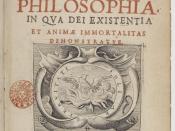The objective of this paper is to examine Descartes' argument for the existence of God. To do this we firstly have to review Descartes' proof of God existence. And after this we will see what objections can his theories hold.
Descartes set out to build a set of arguments designed to prove God's existence. His goal in proving God's existence had to be incontestable, there could not be any doubt. Descartes started by renouncing all his beliefs, so that he would not be shrouded by any misconceptions from reaching the truth. He notices that he has to doubt all of his established ideas, so he needed a starting point, from which he can base his theories. Descartes resolved that he could not doubt that he doubted, he could not doubt that he thinks. Then he could come up with the "Cogito ergo sum", (I think therefore I am), now he was able to proof his own existence.
So the next point was finding out what he was, he knows he exists because he thinks, so at least I must be something that things a "res cogitans". Descartes employs another interesting rule for his judgement. That objective reality cannot exist without formal reality; that is to say that an idea cannot originate without a cause. And that ideas can be less perfect than their cause but never more. Does that mean that according to Descartes, it can not be any concept without its form on the reality (cause)?
Descartes, now try to proof god's existence, so god will make sure that the reality that it is in front of us is true, so no "evil being" can makes us wrong. After establishing those rules, he realizes that he is not perfect. He knows that because he doubts, and therefore...


